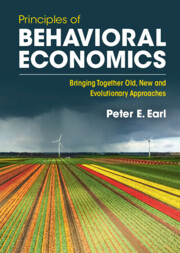Book contents
- Principles of Behavioral Economics
- Principles of Behavioral Economics
- Copyright page
- Contents
- Figures
- Tables
- Preface
- Acknowledgments
- 1 What Is Behavioral Economics?
- 2 What Motivates Us?
- 3 Why Is Life So Full of Problems for Us to Try to Solve?
- 4 How Do We Acknowledge Problems and Assess Options?
- 5 How Do We Deal with Uncertainty and Ambiguity?
- 6 How Do We Search for Solutions to Problems?
- 7 Why Do Some Things Matter More Than Others?
- 8 How Do We Choose?
- 9 How Can Firms and Governments Influence Our Choices?
- 10 What Determines the Productivity of an Organization?
- 11 How Does the Competitive Process Work?
- 12 Are There Any Behavioral Insights for Macroeconomists?
- 13 Can We Be Happy without Destroying the Environment?
- References
- Index
2 - What Motivates Us?
Published online by Cambridge University Press: 18 October 2022
- Principles of Behavioral Economics
- Principles of Behavioral Economics
- Copyright page
- Contents
- Figures
- Tables
- Preface
- Acknowledgments
- 1 What Is Behavioral Economics?
- 2 What Motivates Us?
- 3 Why Is Life So Full of Problems for Us to Try to Solve?
- 4 How Do We Acknowledge Problems and Assess Options?
- 5 How Do We Deal with Uncertainty and Ambiguity?
- 6 How Do We Search for Solutions to Problems?
- 7 Why Do Some Things Matter More Than Others?
- 8 How Do We Choose?
- 9 How Can Firms and Governments Influence Our Choices?
- 10 What Determines the Productivity of an Organization?
- 11 How Does the Competitive Process Work?
- 12 Are There Any Behavioral Insights for Macroeconomists?
- 13 Can We Be Happy without Destroying the Environment?
- References
- Index
Summary
This chapter offers a pluralistic analysis of human motivation as an alternative to utility maximization. Its unifying theme is that choices are underpinned by means-end chains where the underlying “end” can be usefully viewed as the desire to be able to predict and control what is going on in one’s life (as argued in personal construct psychology where people are viewed as if they are like scientists). This includes meeting a hierarchy of needs, as Maslow argued: life is out of control if people can’t meet basic survival needs, are finding everything chaotic, can’t find a view of themselves (their identity) on which to build their lives in society (in relation to fashion and status) and cannot explore what they can achieve or engage in activities that fascinate them. This means that consumption can be for creative and/or defensive reasons. Given how sensory systems work, people also need to have novel things to explore. After examining these views of motivation, the chapter describes research tools from personal construct psychology that can be used for uncovering how people see their options and why they are interested in, or wish to avoid, particular aspects of them.
Keywords
- Type
- Chapter
- Information
- Principles of Behavioral EconomicsBringing Together Old, New and Evolutionary Approaches, pp. 25 - 49Publisher: Cambridge University PressPrint publication year: 2022

